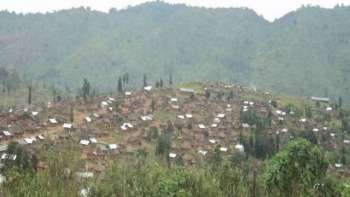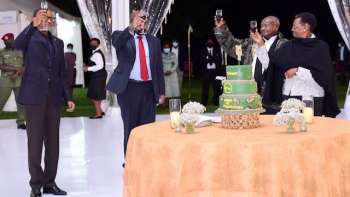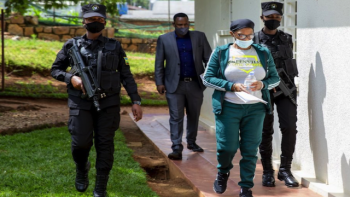Late Rwandan President General Juvénal Habyarimana and Burundian President Cyprien Ntaryamira were assassinated on the evening of 6 April 1994. Their assassination was the catalyst for unprecedented ethnically based massacres. At the end of the massacres, millions of Rwandans, from Hutu, Tutsi and Twa ethnic groups were massacred. The assassination of the presidents and the massacres that followed set off a regional humanitarian catastrophe whose consequences are felt even today, 27 years later. Based on estimates from the NGOs, experts, and, most importantly, the United Nations, the assassination of Juvenal Habyarimana and Cyprien Ntaryamira has led to more than 7 million deaths, so far.
The question however is not about the numbers. The major question is why no one, so far, has been held criminally and civilly accountable, except unassuming scapegoats to accomodate collective political correctness of the international community.
The airplane carrying Rwandan president Juvénal Habyarimana and Burundian president Cyprien Ntaryamira was shot down as it prepared to land in Kigali, Rwanda. The two presidents were returning from signing peace accords to end a bloody civil war that had started 4 years earlier, when the Rwandan Patriotic Front (RPF), supported by current Ugandan President Yoweri Museveni and reinforced by Museveni's own republican guard, military intelligence and special force units invaded Rwanda on October 1, 1990. Although the responsibility for the assassination is disputed, most theories, even reliable evidences point to the rebel Rwandan Patriotic Front (RPF).
General Faustin Kayumba Nyamwasa, the former chief of staff of the RPA, has testified in a sworn confidential statement in front of French prosecutors that General Paul Kagame, the commander of the Rwandan Patriotic Army (RPA) and the de facto leader of the Rwandan Patriotic Front rebels is responsible for the assassination of late Rwandan President General Juvénal Habyarimana and Burundian President Cyprien Ntaryamira, their close aides and the French flight crew (See Here on AfroAmerica Network: Kagame Assassinated Presidents Habyarimana and Ntaryamira, Testifies Gen Kayumba Nyamwasa For French Prosecutors ). The testimony by General Kayumba, especially after escaping many assassination attempts while in exile, was detailed and described how General Paul Kagame himself briefed General Nyamwasa on how he had planned and executed the assassination and its objectives of torpedoing on-going peace negotiations and seizing the country by force.
Other sources have confirmed that the Rwandan Patriotic Front was behind the assassination. The sources point to Alfred Nkubili, a prominent business man whose trucks allegedly transported to Masaka hills missiles that were used by Rwandan Patriotic Front (RPF) troops to shoot down the airplane carrying the Presidents of Burundi and Rwanda, Cyprien Ntaryamira and Juvenal habyarimana (See AfroAmerica Network: Rwanda: Update on Kidnapped Alfred Nkubili and on Egide Gatera, Purported Transporters of Missiles Used in 1994 Assassination of Rwanda and Burundi Presidents). Since July 03, 2020, Alfred Nkubili has been held in prison by the RPF government, afters years of threats, in order to, allegedly, silence him.
Regardless of the causes of the assassination or who did it, questions have regularly been raised on why the United Nations and the World super powers have resisted so far to conduct thorough investigations, even when they did so for assassinations with much much less far reaching consequences.
An interesting book by a british writer and journalist, Michela Wrong, gives insights on the politics, intigues, interests, and other reasons behind covering one of the most deadly events in the human history ( AfroAmerica Network: Why Did Yale University Remove Twitter Banner With Rwandan Dictator Paul Kagame?).
Hence, as Rwandans commemorate the 27 years anniversary of the assassination, it may be reasonable to ask the same question: why didn't the United Nations conduct a formal investigation. Those who tried, including Carla Del Ponte, the former Prosecutor at the UN sponsored Internation Criminal Tribunal for Rwanda set up to try crimes committed in Rwanda during the fateful period, or the French Judge Brugiere, were punished to do so and any attempt was killed by unclear legal and political manoevers.
Meanwhile, as families are remembering the following victims of the assassination of the two presidents, millions of families are also mouring their loved ones who have died, so far, as the result, the consequences, and the ramifications of the assassination.
Rwandan and Burundian government officials:
- Juvénal Habyarimana, President of Rwanda
- Cyprien Ntaryamira, President of Burundi
- Bernard Ciza, Burundian Minister of Public Works
- Cyriaque Simbizi, Burundian Minister of Communication
- General Deogratias Nsabimana, Chief of Staff of the Rwandan Defence Forces
- Colonel Elie Sagatwa, Member of the special secretariat of the Rwandan president, Chief of the Military Cabinet of the Rwandan president
- Major Thaddée Bagaragaza, responsible for the "maison militaire" of the Rwandan president
- Juvénal Renzaho, foreign affairs advisor to the Rwandan president
- Emmanuel Akingeneye, personal physician to the Rwandan president
French aircraft crew of the Airplane managed by the Rwandan Government:
- Jacky Héraud, pilot
- Jean-Pierre Minoberry, copilot
- Jean-Michel Perrine, flight engineer
©2021 AfroAmerica Network.

















